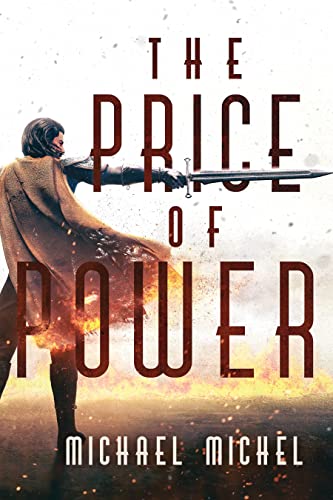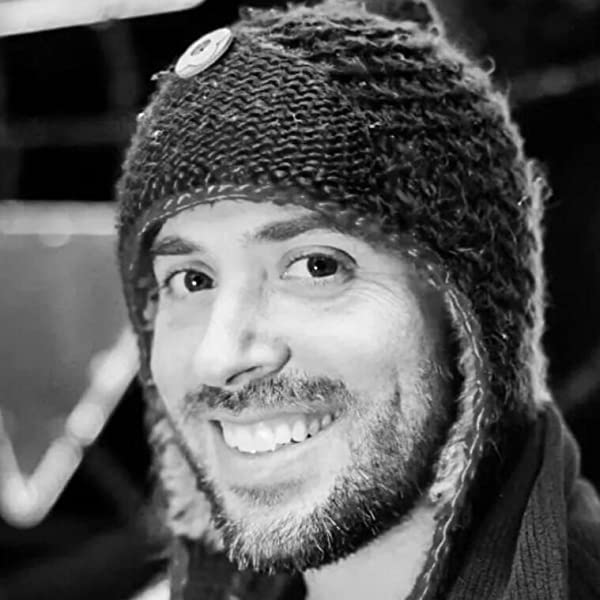Accept, Surrender, & Trust: The BDSM Approach to Authoring Books - Michael Michel
22 Jun 2023No, I’m not into BDSM–to each their own–but as an author, there are plenty of days when I feel like I’m being flogged, or suffocated, or blindfolded, and I desperately need a safe word. So I came up with three of them to stave off continued torture: Accept, Surrender, & Trust.
In the last two and a half years, I’ve written just under a half-million words and edited over six-hundred thousand words on top of that. There’s the first draft of a screenplay somewhere in the mix too. I’m also a father with a day job who likes to work out, and I extravert on the regular. You probably want to know my process. People are obsessed with processes.
You’re probably wondering if the key to being so productive is waking up at 5 a.m. every day before the kids are up. Nope, I get up at 7:30 most days. Maybe you’re thinking I cut out the television to free up space in the evening? Nope. Love TV and film!
Could it be that I light candles around my desk and call upon a dark lord’s blessing? Maybe a specific drink and affirmations? Sit down on a couch? Stand up in a bathroom? Pantser? Plotter? What’s the answer?! No candles, no drink, no couch. Really, I have no system at all. Today I plot. Tomorrow I pants. If you must know, I call myself a “dancer” because I jump between the two. I actually don’t subscribe to any particular system or process, and I’m here to tell you your focus is better spent on something less tangible and less limiting. Writing isn’t a one shoe fits all. There isn’t a singular fixed behavior that can be applied widely. The truth is, you’ll find your own process, your own system, your own path forward.
What I will offer you is an internal reckoning in the form of three principles that can be utilized, not just in writing, but in most endeavors. Regardless of the system or process, this could help.
#1 - Accept the Workload
Life is a tedious and transient experience.
Writing a book of any length is a veritable mountain of work, and after draft one is complete, it doesn’t get any better. If you want to write a lot of books, you’ve got to accept that it’s a ton of work. Not to mention publication which an entirely new range to conquer.
The experience of completing a book might be most accurately equated to running a marathon where the finish line flies around on a biplane overhead. You just hope it lands someday so you can find it and finally tear the ribbon.
The quicker you can accept that you’re going to have more work waiting for you each time you finish a draft, the smoother the process will go and the greater the art will be.
It can’t just be intellectual acceptance either. You’ve got to feel it in your bones. You’ve got to FEEL a relaxed sort of contentment about the work.
Often, I tell myself, “I love writing. I know it’s going to be shit at first, but someday, I’ll make it into something great.” That takes time, dedication, but most importantly, it takes accepting that the MS isn’t there yet.
And that’s okay. You’re okay. It’s okay. Repeat that mantra daily if not hourly because change is a universal constant. If you deny it, you fight it. And if you fight it, you lose precious time and energy.
Accept your work when it’s garbage. Accept your work when it’s golden. Accept who you are and where you’re at along the way.

#2 - Surrender Perfectionism
Let perfectionism go.
Doing this is usually accompanied by the sound of your soul shrieking as a little part of you dies. I’m only sort of kidding. At best, publication will wound your ego deeply. Relinquishing the uncontrollable swirl of chaos surrounding your book’s launch into the world is hard enough.
Adding the magnifying glass of perfectionism to the equation only leads to undue shame and suffering.
Surrender, on the other hand, leads to freedom. So how do we shift our mindset to accommodate this mentality?
For starters, let’s understand that every behavior is driven by a belief system, and every belief system started with good intent.
I always think of rockets in this scenario. In order to get one from earth to space, it takes an immense amount of energy. Giant fuel cells known as “stages” are jettisoned as the rocket climbs through the atmosphere. Once the fuel in each cell is used, the stage becomes dead weight.
Perfectionism is the same. While it pushed me to make The Price of Power as good as it could be, at some point, I needed to let it go of it needing to be perfect in order to coast smoothly into publication. Even now, I sometimes read sections of my book and find a dozen things per page I might change. Well, as authors, we've got to understand a valuable principle:
The work grows with us.
The more we write, the better we get at the skill. By the end of draft 5, you've got ideas about how draft 6 could be better. Every work you write makes you better at writing. If you understand this, you're better able to let go and move on knowing the next project will demonstrate your current skillset more accurately. We’re always growing and honing our craft. I think this is what kills Patrick Rothfuss. He can't help but to infinitely rewrite his work. At some point, you’ve got to let go of perfectionism or you’ll never publish your work at the rate you’d love to write it.
I've found that people don't care as much about the nitty gritty as I do, anyway. Look no further than Brando Sando as an example. The man's not the greatest writer, but damn can he produce a bunch of novels and keep readers' imaginations well-fed. Readers want authors that satisfy their needs. Not the authors' own ego.
Perfectionism is a good tool, but a bad way of life.
And it certainly won’t finish your book. You have to give yourself permission to write badly sometimes. Think of sentences as bumpers at a bowling alley. Some of the bad ones allow your story to stay intact while you get the hang of things. Then, on draft two or three or four, you can cut that shit sentence (lose the bumpers) and start throwing strikes. Special note: I hate bowling. But I’ll let the metaphor stand. Remember, you can always delete and rewrite later. Make your first draft barren, bland, boring–whatever–but make it. That’s the key. The first draft is only you telling yourself the story anyway.
It’s common for folks to look at first or second drafts and say, “Man, this isn’t as good as GRRM or Tolkien or [insert famous person here],” and have their ego injured for a few days they could have spent writing. Listen, you can’t compare an apple to an apple seed and you can’t compare your early draft to a professional author’s final one. Seriously, it’s probably no less than their sixth draft and they have the best editors money can buy combing over it many many times.
Don’t compare your roughest work to their most polished.
And don’t compare your own completed novel to the first draft of your next. That way, too, lies disappointment. As a matter of function, here’s what helps. I cut and or copy a chunk I think isn’t a winner, and then I paste it somewhere with the label, “Old XYZ.” Make sure it’s clearly labeled and easily accessible. This gives me permission to move forward without feeling I’ve lost something I should have spent time perfecting. It’s within reach but no longer in the way.
Honestly though, I never go back. Once I cut, it’s usually done, because you, me–everyone–is getting better all the time.
Remember that. Repeat it, daily if not hourly. “I’m getting better all the time.”
It’s true.

#3 - Trust Yourself
Specifically, your subconscious.
Try this right now. Put your finger to your mouth and start to talk about your day for roughly 30 seconds. Think about how fast your mouth is moving, and how many words are coming out as you speak.
Do it…
…
So here’s the deal. You didn’t have to think too hard about what you were saying, yet you were stringing together words by the dozens, probably using some metaphors, and managed to convey a vast sea of meaning by effortless reflex.
Let that be how you write.
Your subconscious is an incredibly deep well to draw from, far more so than your conscious, more editorial mind. In order to turn off the latter, however, it helps to keep flowing.
When I’m writing, I try not to think at all. If a sentence just isn’t coming out, it probably needs to be skipped. Throw a placeholder in there, “Bill Gets Mad Here,” and move on. You’ll take more time in your rewrites. Actually, I sometimes apply this principle of trust meets speed to my rewrites as well. If I get stuck on a sentence for more than thirty seconds, I shrug and say to myself, “Probably because it’s bad,” and cut it.
I’m not saying you should forego musing, or plotting, or outlining–all of that is a separate beast from writing itself. When I engage those things on a long drive or a walk or a run, I allow for a whole lot of space for my mind to wander. But when I’m writing, I turn off and go.
Don’t break the flow. Bad sentences get cut or highlighted for later consideration. Uncork that subconscious and go somewhere thrilling you might not have expected. Trust yourself and your creative magic will flow.
IN SUMMARY…
If you’re truly into this whole writing thing, there will always be another idea, another book, another draft, etc. At some inevitable point, the journey will feel like a slog.
So accept the workload. You’ll be okay. It’ll be okay.
Bad writing is going to happen regardless, so give yourself permission in advance. The process will go far more smoothly that way.
You’ll get better, word by word, sentence by sentence, book by book. Surrender to your own progress by utilizing perfectionism as a tool, with a proper time and place for its use.
Editing requires conscious focus and diligent attention to detail. Productive writing requires you to turn all of that off so you can reach the finish line. Trust yourself.
You know exactly what you want. You know exactly how you want it. Sometimes, it isn’t conscious, but it is there.
So trust yourself.
That’s when the creative magic flows.
About the author

Michael Michel lives in Bend, Oregon with the love of his life and their two children. When he isn’t obsessively writing, editing, or doing publishing work, he can be found exercising, coaching leaders in the corporate world, and dancing his butt off at amazing festivals like Burning Man. His favorite shows are Dark, The Wire, Arcane, and Norsemen. He loves nature and deep conversations. Few things bring him more joy than a couple of hours playing table tennis.
